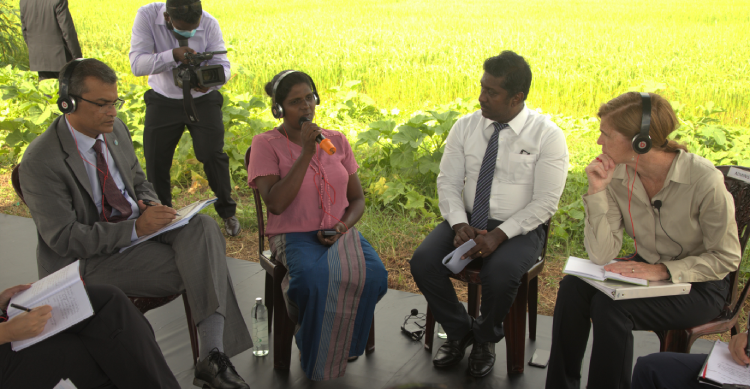September, 11, 2022

The United States, in partnership with FAO, announced an additional $40 million to increase paddy production in Sri Lanka
The United States, through the U.S. Agency for International Development (USAID), announced an additional USD 40 million to strengthen agriculture in Sri Lanka through the Food and Agriculture Organization of the United Nations (FAO). The new funding, subject to Congressional approval, will bring the total USAID funding provided to the Sri Lankan people through FAO this year to $46 million. The funding primarily targets the forthcoming major cultivation season – 2022-2023 Maha (October – March) and the subsequent minor cultivation season – 2023 Yala (April – August). It will provide essential fertilizer and cash transfers for farmers to increase paddy production and avert a protracted food crisis.

The new commitment was announced by USAID Administrator, Ms Samantha Power at a discussion held with paddy farmers and FAO representatives today. The Administrator stated, ”Today, having spoken to these farmers and heard about their needs, I’m announcing an additional $40 million in assistance to Sri Lanka from the American people. Through USAID, this new funding is going to help one million local farmers get the fertilizer and the agricultural necessities they need, just in time for the next planting season. ”
FAO will utilize the funds to strengthen the production capacity of paddy rice farmers through the supply of Triple Super Phosphate (TSP) fertilizer. TSP, which has not been available in the country for the last two cultivation seasons, will be provided for all paddy farmers in Sri Lanka to ensure the forthcoming agricultural seasons are able to feed the Sri Lankan people.
In addition to TSP, USAID funding will provide 186,000 smallholder farmers with land holdings up to 1 hectare (2.5 acres), from the poorest districts in the dry and intermediate zones of Sri Lanka with 50kg of Urea each. Smallholder farmers are among the most vulnerable rural communities, primarily cultivating rice for self-consumption. The lack of fertilizer over two consecutive seasons has significantly reduced yields, forcing most farmers to resort to extreme measures (pawning, buying on credit, dipping into savings, etc.) to meet their food security and nutrition requirements.
To prevent such negative coping strategies, approximately 50,000 of the most vulnerable smallholder farmers cultivating on land holdings of less than or equal to 0.4 hectares will also be provided cash transfers to strengthen the food security and nutrition of their households in the upcoming lean season.
Speaking on the announcement, Mr Vimlendra Sharan, FAO Representative for Sri Lanka and the Maldives thanked the United States for its timely and generous contribution to strengthen the country’s food capacity, especially those of the most vulnerable farmers to contribute toward enhanced paddy production over the coming seasons. He stated, “Through the support provided by USAID, FAO will be able to strengthen food security in Sri Lanka by ensuring the forthcoming agricultural seasons are not compromised while also protecting the most vulnerable smallholder farmers from the worst impacts of the prevailing crisis.”
Video Story